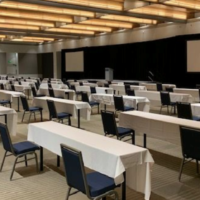David Twigger – with information from Northstar Meeting
January 13th, 2020
As the pandemic has taken its toll on the meetings and hospitality industry, destination management companies have been particularly vulnerable to the huge waves of postponements and cancellations. These on-the-ground experts, ever ready to pull together ground transportation, off-site events, team-building activities and more, normally serve to connect meeting organizers with the wealth of opportunities available in any given locale.
But with Covid-19 thwarting most plans to gather face to face, 65 percent of DMCs have had to cut staff, according to a recent survey from the Association of Destination Management Executives International; others have been forced to relinquish office space as bookings dropped. And in the most dire of scenarios, some companies have ceased operations altogether — as was the case for the global firm Pacific World.
“Everyone has been deeply impacted by Covid-19, but this has been particularly painful for DMCs,” said Stephanie Harris, president of the Incentive Research Foundation. “They rely on group business as their very strong primary source of revenue, unlike hotels or other areas where there’s a leisure component to that business. It’s really changed the conversation around how destination management professionals play in this environment and the value that they bring.”
Though many of these firms have suffered losses and continue to face challenges, DMCs are responding to the crisis with a mix of ingenuity and moxie, developing new skills, expanding their offerings and retooling their business practices to become more sustainable forces in the meetings industry.
Better Business Practices
Beyond their dependence on group travel, DMCs have other intrinsic challenges, such as how these firms collect their fees. Typically, DMCs spend resources before events (for example, creating décor elements in advance); if that event is postponed or cancelled, the DMC is out the dollars they spent. If such costs were not directly spelled out in their contract with the client, the DMC might not be able to recoup that money at all.
This year might have taught these firms a tough lesson about putting all the details on paper, considering 63 percent of the ADMEI survey respondents said just one-fifth or fewer of their in-person programs slated for 2021 have signed agreements.
DMCs are doing work for 2021 business. Likely, they are doing the work without a signed agreement. It is vital that DMCs are paid for their work, even as they are in program development.
This topic was broached during a recent DMC roundtable hosted by the IRF. Nicole Marsh, partner at Imprint Events Group, a DMC Network Company, emphasized that firms like hers are “giving of our time and in many cases have spent months or even years putting programs together, but potentially don’t get a dime until it operates.”
Marsh is already making a shift in contract conversations with clients, where she is now considering if she should charge a flat management fee, a retainer or upfront payment for pre-event work. “We need to do that to protect our company,” she says. “If we just give all this work away and then nothing comes to fruition, there won’t be DMCs in the future.”
Panel speaker Trevor Hanks, managing partner of 360 Destination Group, agrees. “We can’t keep doing what we’ve been doing. It’s just not going to work.”
He stresses, “There has to be collaboration on both sides with our customers, as well as with us. We’re not looking to just nickel-and-dime all the way through. We’re just trying to keep our businesses open and healthy, and get paid for the work that has gone into programs that sometimes take so many months, if not years, to operate.”
To this end, focus groups have been put together to address and further develop recommended contract and fee policies for both DMCs and clients. “This could be an opportunity to adjust the way we operate,” says Tobar.
Expanding Expertise
When business is affected the way it has been in 2020, savvy firms find new ways to be of service to their clients. ADMEI’s survey found that nearly two-thirds of respondents have added expanded and nontraditional offerings to sustain their businesses. Topping the list of new offerings is hybrid events.
“We see hybrid events as an opportunity,” says Hanks. Gatherings with both in-person and virtual elements are here to stay for the midterm and possibly long-term, he adds, so it’s worthwhile to learn how to leverage that fact to his company’s advantage.
Imprint Events, for example, has expanded its entertainment production services with a digital division. Just as DMCs can provide expert advice on the best venues for a program, says Marsh, they should also consider providing tips on which digital platform might best serve a client’s virtual or hybrid event.
“It’s transitioning anything from an incentive to team-building to general-session openers into that virtual platform, and then walking [the client] through it to answer the questions, ‘What does it look like if it is hybrid? What is the on-site attendees’ experience vs. someone watching online, and how can you make it especially engaging?’” she says.
Local Eyes and Ears
While virtual components are sure to play a greater role in events, plenty of organizations are still preparing for in-person gatherings in the near and distant future: More than 80 percent of respondents to ADMEI’s survey have a face-to-face meeting confirmed for the second quarter of 2021 or earlier. But with many planners not willing or able to travel for in-person site inspections, DMCs are finding their on-the-ground expertise to be more important than ever in helping clients become familiar with all the options that are available in a destination.
“DMCs are almost more crucial than they ever had been, simply due to the fact that the landscape has changed so much and the personnel at the hotel that you might have called for the last 10, 15 years might not be employed by that property, or might be furloughed,” says Hanks. “People really need to rely heavily on the DMC as the local expert.”
He points out how for several late 2020 events his firm has organized, including a 500-person event in Florida several weeks ago, the unpredictability of when or whether venues would be open, or which restrictions might be in place, made his DMC services crucial to the planners.
“What everyone has known about a city in the past is changing dramatically,” says Cosimo Bruzzese, vice president of business development, global sales, for PRA, who also participated in the IRF panel. “Some amazing venues that were perfect options in the past may no longer exist in 2021, so the DMC has a crucial part to play in supporting our customers and knowing what is happening.”
Enhancing Safety
DMCs have always been experts on helping to ensure the safety of visiting groups; now, that includes the specific health concerns related to Covid-19.
“[We’ve] really become more of an extension of the planning team as it relates to site visits, virtual site visits, and really understanding how to move people safely, whether it’s busing or registration,” says Marsh. She stresses that DMCs have become vital for helping planners navigate the fast-changing regulations at the state, county and even venue level. “Using DMCs as your resources, as your local eyes and ears, is huge.”
While each hotel, venue and destination might have its own specific measures in place, DMCs can help connect the dots and provide an overall strategy to make sure every attendee is safe. “There is so much pre-thought that goes into the program operations these days,” says Hanks. “Pre-cons are lasting hours now because there is so much protocol. There are so many guidelines when it comes to social distancing, food prep and food service — you really have to go over everything with a fine-toothed comb, so everybody is on the same page and there is no question when the program takes place.”
That touches every part of the attendee journey. “Now, during pre-cons you’re talking about the flow of people leaving the meeting room, going out into the lobby or foyer,” adds Marsh.
Home Improvements
For some DMCs, this unusually quiet year has presented an opportunity to review their business processes and strengthen local partnerships. That has been how Shawn Sawyer, president and creative director of Cacique International, a DMC based in the Bahamas, has approached 2020.
Some DMC’s have been able to retain 98 percent of this year’s business by moving the bookings to 2021 and 2022. After rescheduling those clients, instead of repeatedly checking back with them, we have turned hour focus on what we call “internal customers.”
We have taken this time to truly focus on our procedures, our standard-operating-procedure manuals and our software. We have reached out to long-time local partners to figure out new ways to work with them when business comes back, to “make our services better for us working together and for the end consumer.”
Seeking Support and Collaboration
According to the ADMEI survey, the top resources required now by DMCs are industry advocacy, followed by access to a network of legal, financial, business or medical professionals to consult with, and leadership to provide an organized and unified voice for the industry.
Hanks of 360 Destination Group adds that the challenges of the current crisis have provided an opportunity for DMCs to work together to develop best practices and update existing ones. citing the efforts of ADMEI, along with those of the Live Events Coalition and the DMC Coalition.
As tough as the market remains, Tobar is confident that meetings and events will start up again — but things will likely look quite different than they did before the pandemic hit.
“We cannot experience something like this and not come out changed on the other side,” she posits. “We must learn from this and be stronger for it. We must continue to evolve with the ever-changing landscape, sharpening our skills and broadening our offerings, so we can continue to provide the same levels of service that our clients expect of us when we return.”



